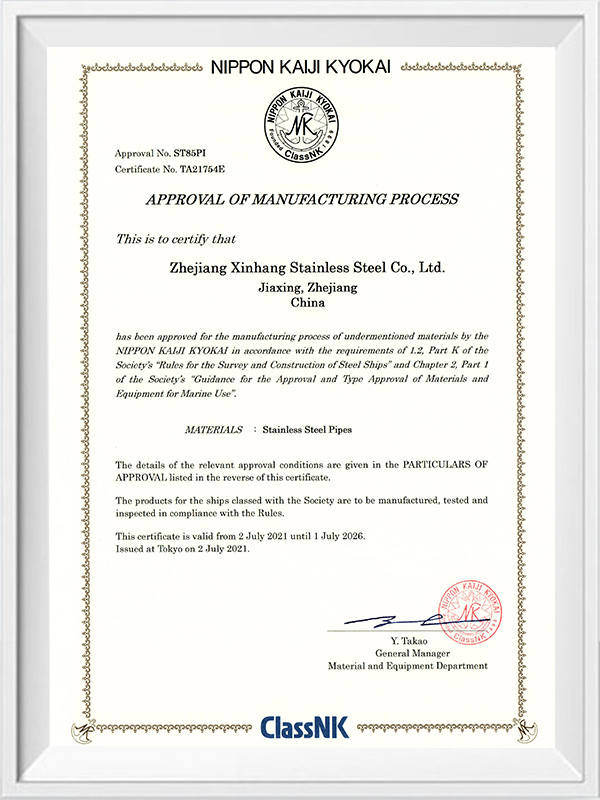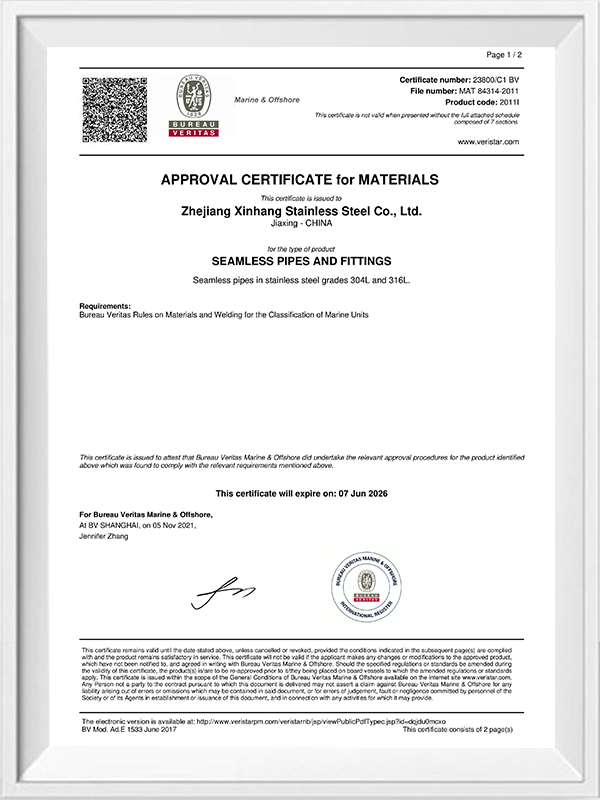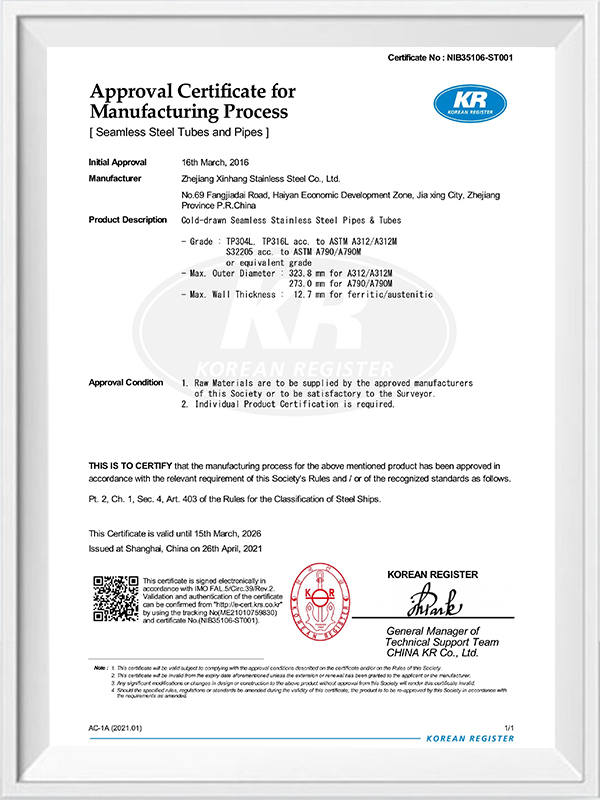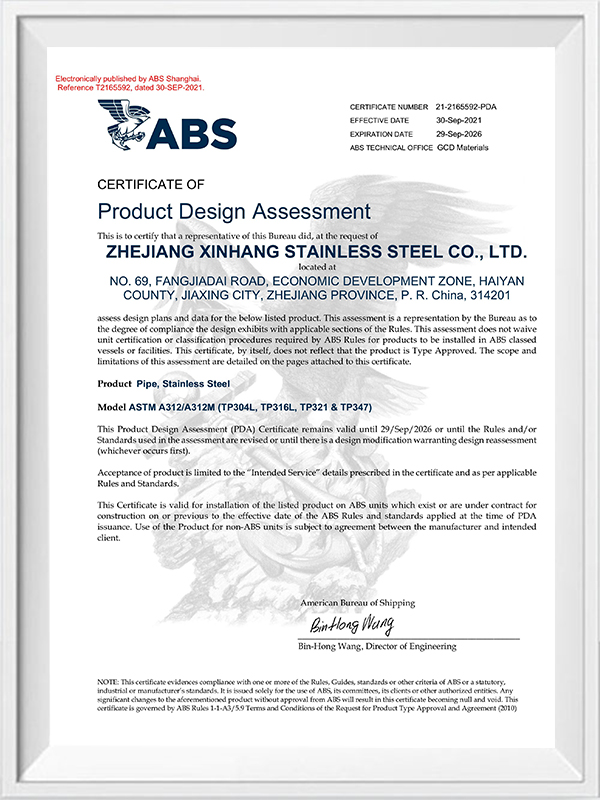

Xinhang Special Material Co., Ltd. Hangzhou Branch is China Stainless Steel pressure vessel tube Suppliers and Stainless Steel pressure vessel tube Factory, founded in 2007 and moved to Longyou Economic Development Zone, Zhejiang Province, in 2022. It covers an area of 130,000 square meters, more than 30 production lines, 300 workers, 20 R&D people, 30 inspection people and an annual output of 50,000 tons.
It has passed ISO9001:2008 quality management system, PED 97/23/EC EU Pressure Equipment Directive certification, China Special Equipment Manufacturing License (Pressure Tube) TS certification, ASME certification, provincial enterprise standardization management system, ISO14000:2004 environment management system, cleaner production (green enterprise), and a series of certifications, as well as China Classification Society (CCS), American Bureau of Shipping (ABS), British Register of Shipping (LR), Deutsche Veritas (GL), Bureau Veritas Society (BV), Det Norske Veritas (DNV), and Korean Register of Shipping (KR) factory certification.
The main products include stainless steel pipes, pipe fittings, flanges, valves, etc., which are widely used in petroleum, chemical industry, nuclear industry, smelting, shipbuilding, pharmaceuticals, food, water conservancy, electric power, new energy, mechanical equipment, and other fields. The company adheres to the corporate tenet of "quality for survival, reputation for development" and wholeheartedly serves every customer to create a win-win situation.




Bottom line: how to weld stainless steel pipe without sugar and leaks For most stainless steel pipe work, the most reli...
View MoreDirect answer: what a “stainless steel pipe pressure rating” really means A stainless steel pipe does not have one univ...
View MoreIn our shop, bending stainless steel pipe is one of those operations that looks simple but punishes shortcuts. Stainless...
View MoreWhat SCH 10 stainless steel pipe specifies (and what it doesn’t) In piping specifications, “SCH” (schedule) is shorthan...
View MoreWhat are the advantages of using stainless steel for pressure vessel tubes?
Corrosion Resistance: Stainless steel exhibits exceptional resistance to corrosion, making it ideal for applications where the vessel will be exposed to corrosive environments, such as in chemical processing or marine industries.
Strength and Durability: Stainless steel possesses high strength and durability, allowing pressure vessel tubes to withstand high pressure and temperature conditions without deformation or failure over time.
Hygienic Properties: Stainless Steel pressure vessel tube is non-porous and easy to clean, making it suitable for applications in the food, pharmaceutical, and medical industries where cleanliness and hygiene are crucial.
Temperature Resistance: Stainless steel maintains its mechanical properties at both high and low temperatures, ensuring reliable performance in extreme operating conditions.
Aesthetic Appeal: Stainless steel has a sleek and attractive appearance, making it suitable for applications where aesthetics are important, such as architectural and decorative elements.
Longevity: Stainless steel has a long service life and requires minimal maintenance, resulting in cost savings over the lifetime of the pressure vessel.
Versatility: Stainless steel is available in various grades and forms, allowing for customization to meet specific application requirements, such as different levels of corrosion resistance, strength, and temperature tolerance.
Compatibility: Stainless steel is compatible with a wide range of fluids and chemicals, reducing the risk of contamination or reaction with the vessel contents.
What are the maintenance and inspection requirements for stainless steel pressure vessel tubes to ensure safe and reliable operation?
Maintenance and inspection are crucial for ensuring the safe and reliable operation of stainless steel pressure vessel tubes. Here are some key maintenance and inspection requirements:
Regular Inspection Schedule: Establish a routine inspection schedule based on industry standards, manufacturer recommendations, and regulatory requirements. Inspections should occur at regular intervals to identify any signs of wear, corrosion, or damage.
Visual Inspection: Conduct visual inspections regularly to check for any visible signs of damage, corrosion, leaks, or deformities on the surface of the pressure vessel tubes. Look for discoloration, pitting, cracks, or dents that may indicate potential issues.
Non-Destructive Testing (NDT): Perform non-destructive testing methods such as ultrasonic testing, radiographic testing, magnetic particle testing, or dye penetrant testing to detect internal defects or flaws in the pressure vessel tubes without causing damage to the material.
Thickness Measurement: Use ultrasonic thickness gauges to measure the thickness of the pressure vessel tubes at various points to ensure they meet the minimum wall thickness requirements. Monitor any thinning or corrosion that may compromise the structural integrity of the Stainless Steel pressure vessel tubes.
Pressure Testing: Periodically conduct pressure tests to verify the integrity and leak tightness of the pressure vessel tubes under operating conditions. Follow established procedures and safety protocols during pressure testing to prevent accidents or over-pressurization.
Corrosion Prevention: Implement corrosion prevention measures such as applying protective coatings, installing sacrificial anodes, or using corrosion inhibitors to mitigate the effects of corrosion and prolong the service life of the stainless steel pressure vessel tubes.
Cleaning and Maintenance: Clean the interior and exterior surfaces of the pressure vessel tubes regularly to remove any debris, contaminants, or deposits that may promote corrosion or fouling. Follow proper cleaning procedures and use compatible cleaning agents to avoid damage to the stainless steel material.
Documentation and Record-Keeping: Maintain comprehensive records of all maintenance and inspection activities, including inspection reports, test results, repairs, and replacements. Keep detailed documentation to track the condition and performance of the pressure vessel tubes over time.
We'll never share your email address and you
can opt out at any time, we promise.